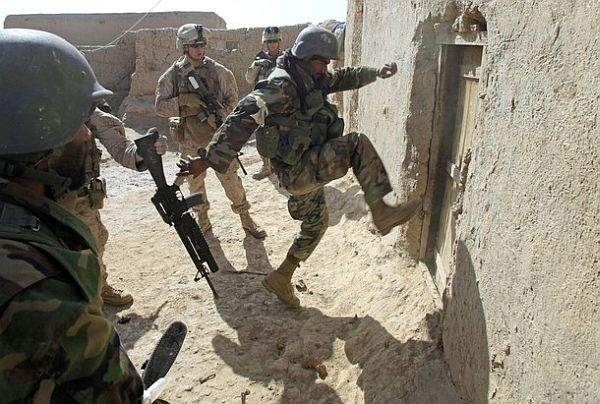At Counterpunch, Alexander Cockburn writes:
The hope of the brave soldier who sent 92,000 secret U.S. documents to Wikileaks was that their disclosure would prompt public revulsion and increasing political pressure on Obama to seek with all speed a diplomatic conclusion to this war. The documents he sent Wikileaks included overwhelming documentary evidence – accepted by all as genuine, of:
* the methodical use of a death squad made up of US Special Forces, known as Task Force 373,
* willful, casual slaughter of civilians by Coalition personnel, with ensuing cover-ups,
*the utter failure of “counter-insurgency” and “nation building”,
*the venality and corruption of the Coalition’s Afghan allies,
*the complicity of Pakistan’s Intelligence Services with the Taliban,
Wikileaks’ founder, Julian Assange, skillfully arranged simultaneous publication of the secret material in the New York Times, the Guardian and Der Spiegel.
The story broke on the eve of a war-funding vote in the U.S. Congress. Thirty-six hours after the stories hit the news stands, the U.S. House of Representatives last Tuesday evening voted Aye to a bill already passed by the Senate that funds a $33 billion, 30,000-troop escalation in Afghanistan. The vote was 308 to 114. To be sure, more US Reps voted against escalation than a year ago when the Noes totted up to only 35. That’s a crumb of comfort, but the cruel truth is that in 24 hours the White House and Pentagon, with the help of licensed members of the Commentariat and papers like the Washington Post, had finessed the salvoes from Wikileaks.
“WikiLeaks disclosures unlikely to change course of Afghanistan war” was the Washington Post’s Tuesday morning headline. Beneath this headline the news story said the leaks had been discussed for only 90 seconds at a meeting of senior commanders in the Pentagon. The story cited “senior officials” in the White House even brazenly claiming that that it was precisely his reading of these same raw secret intelligence reports a year ago that prompted Obama “to pour more troops and money into a war effort that had not received sufficient attention or resources from the Bush administration.” (As in: “Get that death squad operating more efficiently” – an order consummated by Obama’s appointment of General McChrystal as his Afghan commander, transferred from his previous job as top U.S. Death Squad general in charge of the Pentagon’s world-wide operations in this area.)
There’s some truth in the claim that long before Wikileaks released the 92,000 files the overall rottenness and futility of the Afghan war had been graphically reported in the press. Earlier this year, for example, reporting by Jerome Starkey of The Times of London blew apart the U.S. military’s cover-up story after Special Forces troops killed two pregnant Afghan women and a girl in a February, 2010, raid, in which two Afghan government officials were also killed.
It’s oversell to describe the Wikileaks package as a latterday Pentagon Papers. But it’s undersell to dismiss them as “old stories”, as disingenuous detractors have been doing. The Wikileaks files are a damning, vivid series of snapshots of a disastrous and criminal enterprise. In these same files there is a compelling series of secret documents about the death squad operated by the US military known as Task Force 373. an undisclosed “black” unit of special forces, which has been hunting down targets for death or detention without trial. From Wikileaks we learn that more than 2,000 senior figures from the Taliban and al-Qaida are held on a “kill or capture” list, known as Jpel, the joint prioritized effects list.
There are logs showing that Task Force 373 simply killed their targets without attempting to capture. The logs reveal that TF 373 has also killed civilian men, women and children and even Afghan police officers who have strayed into its path.
One could watch Assange being interviewed on US news programs where he would raise the fact that the US military has been – is still – running a death squad along the model of the Phoenix Program, His interviewers simply changed the subject. Liberal gate-keepers complained that the Wikileaks documents were raw files, unmediated by responsible imperial journalists such as themselves. This echoed the usual ritual whines from the Pentagon about the untimely disclosures of “sources and methods”.(I recommend to CounterPunchers Doug Valentine’s pieces on this site — try the one from August 11, 2003 — on the fundamental objective of big assassination programslike Phoenix in instilling general social terror in the target population.)
The bitter truth is that wars are not often ended by disclosures of their horrors and futility in the press, with consequent public uproar.

 Almost 40 years later, Wikileaks founder Julian Assange sees himself in the same role — with a difference. Assange seems to have become caught up in the mystique of whistleblowing and allowed the actors and the mechanism through which they reveal secrets to assume as much importance as the secrets themselves.
Almost 40 years later, Wikileaks founder Julian Assange sees himself in the same role — with a difference. Assange seems to have become caught up in the mystique of whistleblowing and allowed the actors and the mechanism through which they reveal secrets to assume as much importance as the secrets themselves. It would appear that Bradass87 is a 22-year old intelligence analyst, Private Bradley Manning. He was arrested on May 26 and was transferred today from Kuwait to Quantico, Virginia where he is in military custody and has been placed on
It would appear that Bradass87 is a 22-year old intelligence analyst, Private Bradley Manning. He was arrested on May 26 and was transferred today from Kuwait to Quantico, Virginia where he is in military custody and has been placed on 
